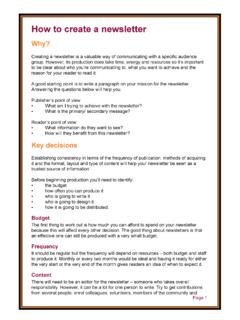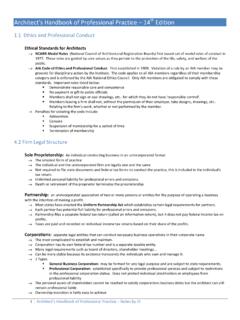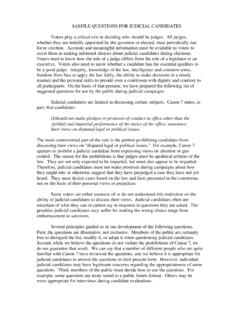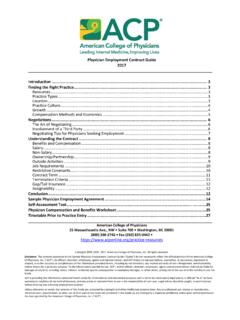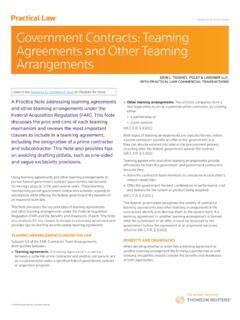Transcription of Why use ADR? Pros & cons
1 why use adr ? pros & consThinking about ADR? This leaflet is for you if you ve heard about alternative dispute resolution (ADR) and are wondering whether to use it to try and resolve a will help you to understand: The advantages of ADR The risks in using ADR What the alternatives areWe try to explain any technical or unusual language as we go along. But you may also find it useful to check out the jargon buster at the back of this leaflet where we also explain some of the terms you may come across when looking into may also be interested in our leaflet Finding and choosing a mediator which looks at one particular type of ADR GuideNote: Fees information in these leaflets applies to England and Wales use ADR?
2 pros & cons - ASA guide2 ContentsBefore you start - what are your alternatives? ..3 Reasons for using ADR ..4 Risks in using ADR ..7 The cost of ADR ..9 Three important points to consider ..11 Jargon buster ..13 why use adr ? pros & cons - ASA guide3 Before you start - what are your alternatives? When you think about whether to use mediation or another type of ADR to sort out a dispute, it s helpful to think about your other options. Are you considering ADR because you think it will be better than the alternative? If so, do you know what those alternatives are? Or are you wondering whether to try ADR because you don t seem to have any other choices? Below we outline your main options:Doing nothingADR might be an alternative to doing nothing.
3 Sometimes doing nothing is the right choice for you. You might feel that the problem is just not worth spending more time or money on, or that it will eventually sort itself out. Or you might feel doing something could make matters worse, and that you can live with the problem as it is. The important thing is that you have thought about it and weighed up the pros and cons of doing nothing, and you know what your options are. Important: If the problem is serious or urgent, however, get advice before making your decision. There are some problems that just can t be left to to courtADR might be an alternative to going to court or to a tribunal. If so, you should think about which process might be cheaper, which might be quicker, which you would find less stressful, and what outcome you might end up with.
4 If someone is threatening to take you to court, you can consider whether you want to suggest some kind of ADR rather than a court hearing. You should get advice about your situation before deciding whether to go to court or not. What is ADR?ADR is the name used for different ways of solving a dispute. For example, mediation, arbitration , adjudication and ombudsmen are all types of ADR. In many circumstances they are alternatives to going to court which is why they are sometimes known as alternative dispute resolution .At Advice Services Alliance we like to use the term appropriate dispute resolution , because we believe that it s important to use the most appropriate way of resolving a dispute.
5 What s appropriate depends on a lot of things your circumstances, the type of dispute, the urgency of the problem, the cost etc. Find out more about different types of ADR in the Jargon use ADR? pros & cons - ASA guide4 Negotiating and working it out yourselfADR may also be an option for trying to resolve a problem where there are no formal alternatives. In neighbour disputes, for example, there may not be an easily available legal remedy. If this is the case, you should think about whether attempting ADR is better than an informal chat with your neighbours, or in fact doing nothing at forced to consider ADRYou always have a choice about whether or not to use ADR, but you might not have a choice about considering it.
6 If you are going to court to deal with a family dispute such as divorce or separation, for example, you are required to meet with a mediator first and consider mediation. In future this might also be true if you are going to court with a non-family dispute, such as a consumer claim. And if you have a dispute covered by a contract that requires you to use arbitration , you might not have a way, over the next few pages we outline some of the commonly agreed pros and cons of different types of ADR. Reasons for using ADR There are ongoing debates about the pros and cons of different ADR options. When thinking about the claims that are made for any dispute resolution option, do bear in mind who is making the claim, and why.
7 Some of the claims are true, but only in some will commonly claim that mediation is quicker and cheaper than going to court. Mediation can be much cheaper than taking legal action. However, research published by the government shows that this is not always the case. As you might expect, when mediation ended in a settlement, people thought it was quicker and cheaper than going to a full court hearing. When the mediation didn t end in a settlement, they thought it just added time and costs to the process. There are fees for making a claim in court. Currently, in England and Wales, fees for making a small claim range from 35 (for a claim up to 300) to 120 (for a claim up to 5,000).
8 The fees for making a claim using the courts Money Claims Online service are slightly use ADR? pros & cons - ASA guide5If your claim is not for money, but for something else for example, if you are asking the court to tell someone to do something or stop from doing something the fee is that if you can t afford to pay the court fees, you might be entitled to a reduction in the fee or even having the fee waived so you don t pay it at all. This is important, because (unlike the courts) most mediation providers won t reduce their fees if you can t afford to remember that there may be other fees involved in using the courts including a fee for allocating the case and a fee for enforcing a payment ordered by the forms of ADR can be quicker than going to court.
9 If you are involved in a small claim in court, for example, your case can go to mediation sooner than a hearing can be forms of ADR, such as ombudsmen investigations, can take a long time. So if the matter needs to be resolved urgently, get advice from an adviser before deciding. For example, you might need to go to court to get an injunction to stop someone doing something, if your safety or home is at tipFind out what the costs of taking out a court claim would be, then compare these to the ADR options. If you receive certain benefits then you don t have to pay court fees, and if you are making a small claim then you won t be asked to pay for the other side s legal costs.
10 So the cost of going to court might be less than paying for don t forget that most court cases don t actually go to a hearing before a judge but instead end in a settlement. This, too, is likely to be cheaper than a full court hearing. So a more realistic cost comparison might be between you (or your adviser) negotiating a settlement directly with the other side, and choosing to go to a mediation session where you can tell your own story. Some forms of ADR are free to use such as ombudsmen schemes. These are likely to be cheaper than taking legal action. But tribunals are also free for now. There are proposals to charge fees for employment tribunals, but other tribunals make no charge for lodging an use ADR?

